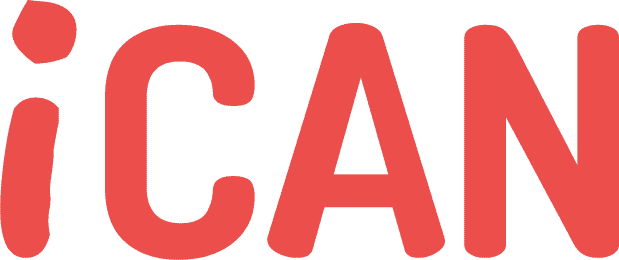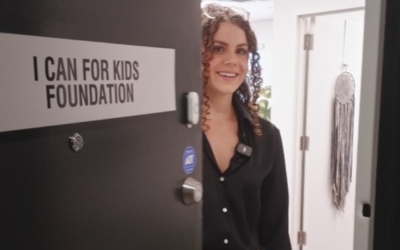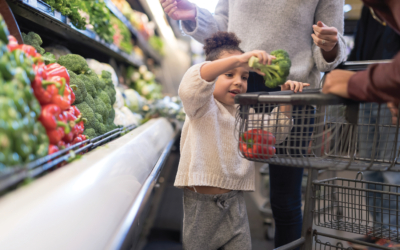Like everybody else, those of us at I Can for Kids (iCAN) recognize the comfort and security of traditions. Familiar practices feel easy, safe, and reassuring. Yet there are major risks if our society relies blindly on the comfort of longstanding approaches to major social and health issues. When it comes to empowering households who lack the income to buy enough food, iCAN realized how more than forty years of traditional food programming had fallen significantly short. That’s why in 2020, we took advantage of the global pandemic to implement and study a rapid and innovative change to our response to food insecurity.
Over the past five years, our grocery gift card model has slowly disrupted the familiar, time-honoured, yet outdated tactics used to assist food-insecure households. We’ve seen firsthand how dignity, choice, and trust drive much better outcomes than conventional food programs ever could. As a result, iCAN is committed to centering our work on quality evidence and regular feedback from the families we serve—placing their needs and voices above tradition, pride, or popular opinion.
The birth of an innovative prototype
By 2021, the preliminary results of the initial research on the iCAN grocery gift card program validated the many benefits and advantages of our new approach compared to our former food program. We immediately began to advocate for major changes across all sectors who wished to make a tangible and measurable impact on poverty and food insecurity. We reinforced our newfound enthusiasm with two key blogs:
- We offered a new paradigm to inspire a shift towards income-based responses that empower food-insecure households to regain control over their lives.
- We outlined strategies to encourage collaborative action and high-performing partnerships to promote a streamlined approach that outperforms the cumbersome process and high costs of food provision programs.
Key milestones in the evolution of our approach
As more researchers publish studies on the benefits of grocery gift cards, the promising advantages of this new model are gaining significant attention and traction across the country. iCAN often provides counsel to many food programs and food banks across North America who are seeking insights on how to shift to an income-based model that reaches food-insecure populations much faster and more cost-effectively. In addition, we sense a shift among economic, political, health, and social sectors who recognize the desperate need for a more dignified and efficient approach to curb the escalating rates of food insecurity across Alberta.
Here’s a timeline of local and national dialogue and action on the grocery gift card approach:
- Fall 2021: iCAN shares preliminary findings on the benefits of grocery gift cards uncovered during interviews with food-insecure families and agency partners to inspire new reasoning
- Spring 2023: iCAN forges a successful collaboration with the Town of Drumheller to offer mentorship as they design and implement their own grocery gift card pilot program
- Summer 2023: University of Calgary researchers publish key results from the first iCAN study in the peer-reviewed and globally recognized journal Public Health Nutrition
- Fall 2023: Brown Bagging for Calgary’s Kids publish highlights on their pilot grocery gift card project and the results of their evaluation echo exactly what we learned in our original study: grocery gift cards reduce stress, improve diet quality, and increase flexibility with limited budgets
- December 2023: The Government of Newfoundland and Labrador embark on a new plan to reduce high rates of food insecurity by prioritizing income-based initiatives, including the distribution of grocery gift cards to low-income households
- Spring 2024: The public health dietitians at Alberta Health Services publish the Household Food Insecurity Community Action Guide that specifically outlines the benefits of the iCAN grocery gift card model as a dignified and efficient way to tackle food insecurity.
- Fall 2024: iCAN publishes a free, step-by-step guide on how to set up a grocery gift card program to help meet the growing demand for support from charities and organizations far and wide
- December 2024: Nourish publishes a scan on the impacts of healthy food prescribing which notes how iCAN strongly recommends grocery gift cards to empower households with maximum control, choice, and dignity
- January 2025: iCAN initiates a new partnership with McMan Central through generous funding from Nutrien to provide grocery gift cards to food-insecure families living in rural areas across central Alberta.
- Spring 2025: iCAN embarks on new research with the University of Calgary to gain a deeper understanding of the experiences of families who access our grocery gift card program and to calculate a social return on investment
The road ahead
Experts across Canada outline many income-based options that could prevent and reduce household food insecurity. These types of policies offer great potential because they help build a stronger financial safety net for food-insecure people who live on unstable or inadequate incomes. Thought leaders propose a range of ideas, including:
- increasing social assistance rates to match inflation
- raising minimum wages to living wages
- establishing a national basic income program
- offering greater tax benefits to low-income households
- reducing tax rates for low-income individuals
While we wait for stronger policy solutions, iCAN remains steadfast in our commitment to empower vulnerable children and families with an income-based response that optimizes dignity and choice. Here are a couple key actions we recently implemented:
- We expanded our agency partner network to target our support to a wider range of food-insecure kids and families across Calgary and rural communities in central Alberta.
- We initiated a plan to conduct and share a robust evaluation of our new rural program with McMan Central to uncover how smaller communities can adapt our model to meet the unique needs of food-insecure households who have little access to charitable resources.
Most importantly, the success of our grassroots program continues to boost wider advocacy for the design of income-based policies at local, provincial, and federal levels. We’d love for you to join us in transforming how our broader society can reduce the harmful impacts of food insecurity.
When you donate today, you enable iCAN to inspire a wider audience of thought leaders and strengthen our ability to drive evidence-based changes for food-insecure children and families across Alberta.To join iCAN’s expanding list of donors, sponsors, and champions, check out the different ways you can get involved or donate. To stay updated on our work, please subscribe to our monthly newsletter.
About I Can for Kids Foundation
I Can for Kids works closely with multiple agency partners to target and distribute grocery gift cards to food-insecure families in greatest need. The iCAN grocery gift card program is a more dignified and inclusive approach to dealing with food insecurity, allowing families to shop where everyone else shops and to choose foods that are appropriate for their health and cultural needs. Explore their website to discover more about iCAN’s impact over the years.
For more information and media inquiries, please contact iCAN Executive Director, Bobbi Turko at bobbi@icanforkids.ca.




